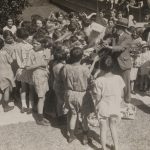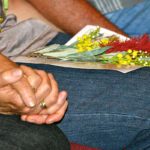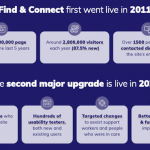The wonderful world of Twitter makes it possible to follow what’s happening at various conferences and events around the world, for those of us who can’t travel. The Association of Canadian Archivists has just had its annual conference, this year in Montreal, and following the #ACA2016 tweets has been fascinating. I’ve felt a bit of envy for those Australians who were fortunate enough to be there – including Joanne Evans from Monash University who was on a panel about ‘archival activism‘.
I was lucky enough to attend ACA in Winnipeg in 2013 and learn from our colleagues in Canadia.
On my trip, I learned about the British Home Children, Canada’s term for former child migrants sent there from Britain.
In Winnipeg, I also visited the offices of the Truth and Reconciliation Commission and met with archivists working on this project. The TRC into the residential school system in Canada has so many parallels with inquiries in Australia – including the current Royal Commission, and past Senate inquiries into children in institutional ‘care’, child migration and of course the 1997 inquiry into the Stolen Generations.
The TRC was a prominent topic at the 2013 conference. As a visitor from Australia working on the Find & Connect project a session with church archivists was particularly interesting for me. In this session (Journey to Reconciliation: Church Records and the Indian Residential Schools Legacy) the panellists talked about how various Canadian churches had responded to the TRC and dealt with the legacy of past policies that resulted in Indigenous children being separated from family, culture and country.
That 2013 session was chaired by Anglican archivist Melanie Delva, who popped up again in the twitter feed for #ACA2016. Twitter tells me that Melanie received a standing ovation after her presentation in Montreal on 5 June 2016.
Standing ovation for Melanie Delva's powerful and brave story of experiencing residential school records as an archivist #aca2016
— John Roberts (@john_roberts) June 4, 2016
I seriously wish I’d been there for this session, titled ‘Emotional Labour in the Archives: glimpses into practice‘. Apart from the extraordinary response to Melanie’s presentation, the session dealt with a topic close to my heart, the ’emotional and affective labour required to do archival work’.
The myth of the archivist as an impartial, objective guardian of records that provide a unproblematic reflection of ‘the past’ has been well and truly discredited (largely thanks to the work of Canadian archival scientists like the late Terry Cook). But the sector is only just beginning to come to terms with issues like the ethics and values of archivists, archival activism, and the emotional aspects of the profession. These issues become stark when archivists are responsible for the management of records relating to injustices, rights violations and traumatic events.
Very moved by the response to the #ACA2016 session. Let's keep the conversation alive! #notjust3womentalkingfeelings
— Melanie Delva (@melaniedelva) June 4, 2016
Mike Jones wrote about the potential for archivists to suffer vicarious trauma, and the importance of doing our job in ways that don’t contribute to further traumatisation or harm in 2014. Mike was prompted to think about what trauma-informed archival access might look like after doing training with the Find & Connect web team.
Discussion of issues of trauma, emotion and affect needs to become mainstream in the archival profession. Like Kate Theimer, I believe that these issues need to become part and parcel of the development and training of archives and records management professionals.
#ACA2016 Everyone agrees that ethics & dealing w/emotional labour/trauma needs to be deeply embedded in archives education
— Kate Theimer @ktheimer@glammr.us (@archivesnext) June 4, 2016
Yes, let’s keep the conversation going …






Cate O'Neill
June 7, 2016 12:30 pmAnd for those who are interested in following up on issues of archives and emotion, trauma and archival activism, I recommend this post (and the links) from Michaela Hart’s ‘originaldisorder’ blog: https://originaldisorder.wordpress.com/2016/01/01/diving-below-the-surface/
Frank Golding
June 6, 2016 4:50 pmThis conference sounds terrific. I wonder where we can get access to the papers?
Cate O'Neill
June 7, 2016 10:55 amIt would seem that conference proceedings including podcasts are made available only to members of the ACA. There is general info, programs etc, from past conferences here: http://archivists.ca/content/past-conferences – I will chase this up though and report back!